广外大学听力口语试卷(B卷)
2014-2017年广东高考听说Part B汇编
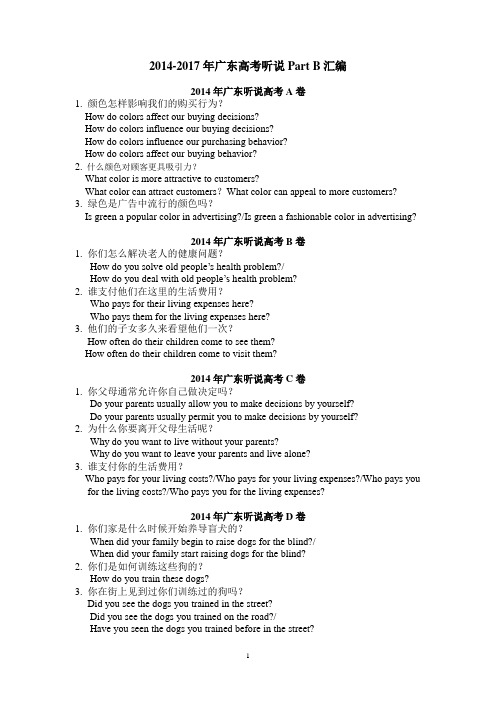
2014-2017年广东高考听说Part B汇编2014年广东听说高考A卷1. 颜色怎样影响我们的购买行为?How do colors affect our buying decisions?How do colors influence our buying decisions?How do colors influence our purchasing behavior?How do colors affect our buying behavior?2.什么颜色对顾客更具吸引力?What color is more attractive to customers?What color can attract customers?What color can appeal to more customers?3. 绿色是广告中流行的颜色吗?Is green a popular color in advertising?/Is green a fashionable color in advertising?2014年广东听说高考B卷1. 你们怎么解决老人的健康问题?How do you solve old people’s health problem?/How do you deal with old people’s health problem?2. 谁支付他们在这里的生活费用?Who pays for their living expenses here?Who pays them for the living expenses here?3. 他们的子女多久来看望他们一次?How often do their children come to see them?How often do their children come to visit them?2014年广东听说高考C卷1. 你父母通常允许你自己做决定吗?Do your parents usually allow you to make decisions by yourself?Do your parents usually permit you to make decisions by yourself?2. 为什么你要离开父母生活呢?Why do you want to live without your parents?Why do you want to leave your parents and live alone?3. 谁支付你的生活费用?Who pays for your living costs?/Who pays for your living expenses?/Who pays you for the living costs?/Who pays you for the living expenses?2014年广东听说高考D卷1. 你们家是什么时候开始养导盲犬的?When did your family begin to raise dogs for the blind?/When did your family start raising dogs for the blind?2. 你们是如何训练这些狗的?How do you train these dogs?3. 你在街上见到过你们训练过的狗吗?Did you see the dogs you trained in the street?Did you see the dogs you trained on the road?/Have you seen the dogs you trained before in the street?2014年广东听说高考E卷1. 你不是说你想当一名语言教师吗?Didn’t you say you wanted to be a language teacher?/Didn’t you say you wanted to become a language teacher?2. 你第一天教课感觉如何?How do you feel the first day of teaching?/How was your first day of being a teacher?3. 为什么你认为自己能成为语言教师?Why do you think you can become a language teacher?/Why do you think you can be a language teacher?2014年广东听说高考F卷1. 你父母喜欢中国的什么呢?What do your parents like about China?/ What do your parents love about China?2. 为什么你不买些京剧DVD作为礼物?Why don’t you buy some Beijing Opera DVDs as gifts?/Why not purchase some Beijing Opera DVDs as presents?3. 你打算给弟弟和妹妹买什么礼物呢?What gifts do you plan to buy for your brother and sister?2015年广东听说高考A卷1. 你做过这个话题的研究吗?Have you done the research about the topic?/ Have you done the survey about the topic?/ Have you researched the topic?/ Have you studied the topic?2. 人们一般做些什么来减少压力呢?What do people usually do to reduce stress?/ What do people often do to reduce stress?/ What do people usually do to relax?/ What do people often do to relax?/ What do people usually do to relieve pressure?/ What do people often do to relieve stress?3. 为什么压力可以是正能量呢?Why can stress be positive energy?/ Why can stress be positive thing?/ Why can pressure be positive energy?/ Why can stress be positive thing?2015年广东听说高考B卷1. 什么是改变坏情绪最有用的方法?What is the most useful way to change a bad mood?/ What is the most useful way to change a bad feeling?/ What is the most useful thing to change a bad mood?/ What is the most useful thing to change a bad feeling?/ What is the most useful method to change a bad mood?/ What is the most useful method to change a bad feeling?/ What is the most effective way to change a bad mood?/ What is the most effective method to change a bad feeling?2. 音乐有助于改变坏情绪吗?Is music helpful to change a bad mood?/ Is music helpful to change a bad feeling?/ Does music contribute to changing a bad mood?/ Does music contribute to changing a bad feeling?/ Is listening to music helpful to change a bad mood?/ Is listening to music helpful to change a bad feeling?3. 颜色怎样影响我们的情绪?How do colors affect our moods?/ How do colors influence our moods?/ How do colors affect our feelings?/ How do colors influence our feelings?/ How do colors have an influence on our moods?/ How do colors have an influence on our feelings?2015年广东听说高考C卷1. 对你来说最大的挑战是什么?What is the biggest challenge to you?/ What is the greatest challenge to you?/ What is the biggest challenge for you?/ What is the greatest challenge for you?2. 你认为每个人都可以被培训成好老师吗?Do you think that everyone can be trained to be a good teacher?/ Do you think that everyone can be trained to become a good teacher?/ Do you think everyone can be trained as a good teacher?/ Can everyone be trained to be a good teacher?/ Can everyone be trained to become a good teacher?3. 好老师有什么特点?What characteristics do good teachers have?/ What features do good teachers have?2015年广东听说高考D卷1. 两者之间的区别是什么?What’s the difference between them?/ What’s the difference between the two?/ What are the differences between them?/ What are the differences between the two?2. 我需要参加每一次的活动吗?Do I need to attend every activity?/ Do I need to take part in every activity?/ Do I need to participate in every activity?/ Do I need to attend each activity?/ Do I need to take part in each activity?/ Do I need to participate in each activity?/ Is it necessary for me to attend every activity?/ Is it necessary for me to take part in each activity?3. 我怎样才能加入这个协会呢?How can I join this club?2015年广东听说高考E卷1. 你的家乡离这里远吗?Is your hometown far from here?2. 回家乡的路上给你印象最深刻的是什么?What impressed you most on the way to your hometown?/ What impressed you best on the way to your hometown?/ What gave you the deepest impression on the way to your hometown?/ What was the most impressive thing on your way to your hometown?3. 你现在更喜欢在哪儿过春节呢?Where do you prefer to spend the Spring Festival?/ Where do you like more to spend the Spring Festival?2015年广东听说高考F卷1. 你怎么看待穿校服?How do you think about wearing school uniforms?/ What do you think of wearing school uniforms?/ What’s your opinion about wearing school uniforms?2. 穿同样的衣服不烦吗?Isn’t it boring to wear the same clothes?/ Isn’t wearing the same clothes boring?/ Don’t you feel bored to wear the same clothes?3. 你小时候穿校服吗?Did you wear school uniforms when you were young?/ Did you wear school uniforms when you were a kid?/ Did you wear school uniforms when you were a child?2015年广东听说高考G卷1. 大学课程是怎样安排的?How are the university classes arranged?/ How are the university courses arranged?/ How are the college classes arranged?/ How are the college courses arranged?/ How are the classes arranged in university?/ How are the courses arranged in college?2. 你们大学会给学生提供出国学习的机会吗?Does your university offer the students a chance to study abroad?/ Does your university give the students a chance to study abroad?/ Does your university provide the students with a chance to study abroad?/ Does your college offer a chance to study abroad to the students?/ Does your college give a chance to study abroad to the students?/ Does your university provide the students with a chance to study abroad?3. 你们大学哪个系最好?Which department is the best in your university?/ Which is the best department in your university?/ Which department is the best in your college?/ Which is the best department in your college?2016年广东听说高考A卷1. 在大家庭中成长是怎样的?What was it like growing up in a big family?/ How did you like growing up in a big family?/ What was growing up in a big family like?2. 最艰难的部分是什么?What was the most difficult part?/ What was the hardest part?/ What was the toughest part?/ What was the most difficult thing?/ What was the hardest thing?/ What was the toughest thing?3. 年幼的孩子比年长的孩子更幸运吗?Are younger children luckier than the elder children?/ Are younger children more fortunate than the elder children?2016年广东听说高考B卷1. 你12岁时,学校是怎样的?How was the school when you were twelve?/ What was the school like when you were twelve?2. 你认为体育活动将是一样的吗?Do you think that sports will be the same?/ Will sports be the same in youropinion?3. 最大的变化会是什么?What will the biggest change be?/ What is the biggest change going to be?/ What can the biggest change be?/ What will the greatest change be?/ What is the greatest change going to be?/ What can the greatest change be?2016年广东听说高考C卷1. 那是什么意思呢?What does that mean?/ What do you mean?2. 作为老师,你怎样使用这个系统?How did you use the system as a teacher?/ As a teacher, how did you use the system?/ How did you use the system being a teacher?/ Being a teacher, how did you use the system?/ How did you use the system working as a teacher?3. 学生们喜欢这种交作业的方式吗?Did the students like the way to submit assignments?/ Did the students like the way of submitting assignments?/ Did the students like the way to hand in homework?/ Did the students like the way of handing in homework?/ Did the students like the way to hand in assignments?/ Did the students like the way of handing in assignments?2016年广东听说高考D卷1. 你做什么让观众大笑?What do you do to let the audience laugh?/ What do you do to make the audience laugh?2. 你是怎么成为一个喜剧演员的?How did you become a comedian?3. 有什么成功的秘诀吗?Do you have any secrets to success?/ What secrets to success do you have?/ Are there any secrets to success?2016年广东听说高考E卷1. 你从课程中学到了什么?What do you learn from the course?/ What do you study from the course?2. 你怎么知道女性在学习语言方面做得更好?How do you know that women can do better in learning languages?3. 他们在行为上有什么差异?What are the differences in their behaviors?/ What is the difference about their behaviors?2017年广东高考听说A卷1. 那是什么意思呢?What does that mean? What does it mean? What does that mean?What’s the meaning of that?2. 你有很多空闲时间旅游吗?Did you have a lot of free time for travelling? Did you have much leisure time for travelling? Was there plenty of spare time for you to travel?3. 游客能找到哪些工作呢?What kinds of jobs can the travelers find? What kinds of work can the tourists get?2017年广东高考听说B卷1. 你认为机器人有一天会取代人类吗?Do you think that robots will replace humans one day?Do you think that robots will take the place of human beings one day?2. 机器人可以做哪些危险的工作?What kinds of dangerous jobs can robots do? Are there any dangerous jobs that robots can do?3. 如果我们被机器人取代了该怎么办?What can we do if robots take place of us? What should we do if we are replaced by robots?2017年广东高考听说C卷1. 为什么家长认为这是个问题?Why do parents think it is a problem? Why do parents think that is a problem?2. 这仅仅发生在童年吗?Does it only happen in childhood? Does it only occur in our childhood?3. 你有什么建议给家长呢?What is your advice for parents? What suggestions do you have for parents?Can you give some advice to parents?2017年广东高考听说D卷1. 那个医生是如何帮助你的?How did the doctor help you? How did that doctor help you?What did the doctor do to help you?2. 现在有很多人以这种形式看病吗?Do many people see their doctors in this way nowadays?Do many people visit their doctors in such a way nowadays?Nowadays, do many people use this method to see their doctors?3. 网络医生看病的弊端是什么?What are the problems of seeing an e-doctor?What are the disadvantages of visiting e-doctors?Can you tell me the problems of seeing e-doctors?Are there any problems of seeing an e-doctor?2017年广东高考听说E卷1. 你什么时候开始对丝绸历史感兴趣的?When did you begin to be interested in silk history?When did you start to be interested in silk history?When did you become interested in silk history?2. 中国丝绸如何传播到其他国家?How was silk from China spread to other countries?How was Chinese silk taken to other countries?How did Chinese silk reach other countries?3. 丝绸工业的现状是什么?What is the silk industry like now?What is the present condition of the silk industry?What is the current situation of the silk industry?How is the silk industry nowadays?。
2023年广东高考英语听说考试试题真题及答案(Test B)
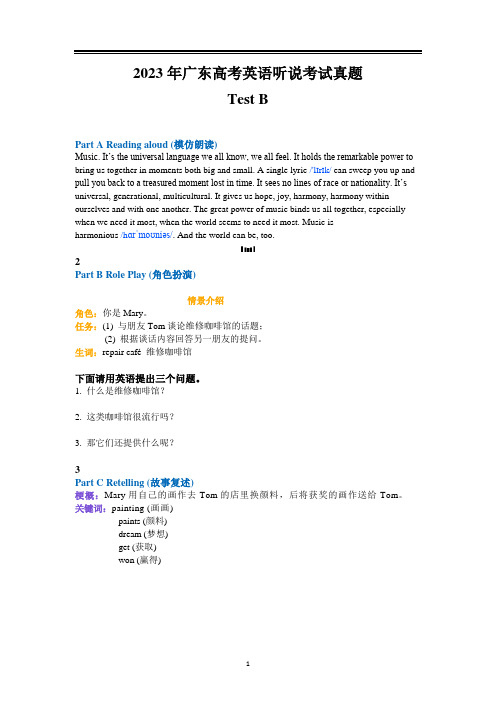
2023年广东高考英语听说考试真题Test BPart A Reading aloud (模仿朗读)Music. It’s the universal language we all know, we all feel. It holds the remarkable power to bring us together in moments both big and small. A single lyric /'lɪrɪk/ can sweep you up and pull you back to a treasured moment lost in time. It sees no lines of race or nationality. It’s universal, generational, multicultural. It gives us hope, joy, harmony, harmony within ourselves and with one another. The great power of music binds us all together, especially when we need it most, when the world seems to need it most. Music isharmonious /hɑrˈmoʊniəs/. And the world can be, too.2Part B Role Play (角色扮演)情景介绍角色:你是Mary。
任务:(1) 与朋友Tom谈论维修咖啡馆的话题;(2) 根据谈话内容回答另一朋友的提问。
生词:repair café维修咖啡馆下面请用英语提出三个问题。
1. 什么是维修咖啡馆?2. 这类咖啡馆很流行吗?3. 那它们还提供什么呢?3Part C Retelling (故事复述)梗概:Mary用自己的画作去Tom的店里换颜料,后将获奖的画作送给Tom。
2022年广东高考英语听说考试Test B试题及答案(含录音文本)
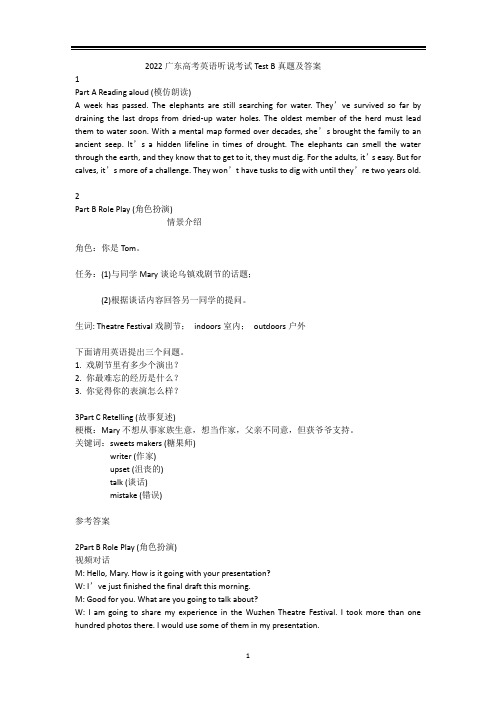
2022广东高考英语听说考试Test B真题及答案1Part A Reading aloud (模仿朗读)A week has passed. The elephants are still searching for water. They’ve survived so far by draining the last drops from dried-up water holes. The oldest member of the herd must lead them to water soon. With a mental map formed over decades, she’s brought the family to an ancient seep. It’s a hidden lifeline in times of drought. The elephants can smell the water through the earth, and they know that to get to it, they must dig. For the adults, it’s easy. But for calves, it’s more of a challenge. They won’t have tusks to dig with until they’re two years old.2Part B Role Play (角色扮演)情景介绍角色:你是Tom。
任务:(1)与同学Mary谈论乌镇戏剧节的话题;(2)根据谈话内容回答另一同学的提问。
生词: Theatre Festival戏剧节;indoors室内;outdoors户外下面请用英语提出三个问题。
1. 戏剧节里有多少个演出?2. 你最难忘的经历是什么?3. 你觉得你的表演怎么样?3Part C Retelling (故事复述)梗概:Mary不想从事家族生意,想当作家,父亲不同意,但获爷爷支持。
广东听说考试历年真题试卷
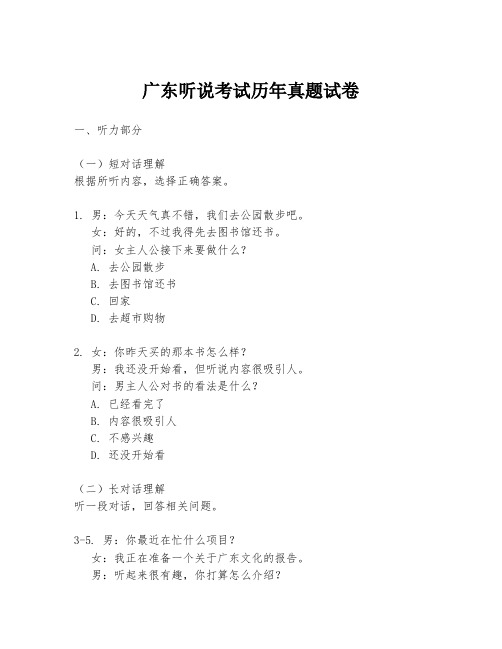
广东听说考试历年真题试卷一、听力部分(一)短对话理解根据所听内容,选择正确答案。
1. 男:今天天气真不错,我们去公园散步吧。
女:好的,不过我得先去图书馆还书。
问:女主人公接下来要做什么?A. 去公园散步B. 去图书馆还书C. 回家D. 去超市购物2. 女:你昨天买的那本书怎么样?男:我还没开始看,但听说内容很吸引人。
问:男主人公对书的看法是什么?A. 已经看完了B. 内容很吸引人C. 不感兴趣D. 还没开始看(二)长对话理解听一段对话,回答相关问题。
3-5. 男:你最近在忙什么项目?女:我正在准备一个关于广东文化的报告。
男:听起来很有趣,你打算怎么介绍?女:我会从广东的地理位置、历史、美食和传统节日等方面进行介绍。
问:3. 女主人公正在准备什么?A. 广东文化的报告B. 地理报告C. 历史报告D. 美食报告4. 女主人公打算从哪些方面介绍广东文化?A. 地理位置和历史B. 美食和传统节日C. 地理位置、历史、美食和传统节日D. 传统节日和美食5. 男主人公对女主人公的项目感兴趣吗?A. 是的,听起来很有趣B. 不感兴趣C. 没有表达兴趣D. 觉得无聊二、口语部分(一)角色扮演根据所给情景,进行角色扮演。
6. 情景:你是一家公司的前台接待员,一位客户来访,想要了解公司的产品信息。
前台接待员:您好,欢迎光临我们公司,请问有什么可以帮助您的?客户:我想了解一下你们的产品。
前台接待员:当然可以,我们有多种产品,您想了解哪一类呢?(二)信息转述听一段信息,然后用自己的语言转述。
7. 情景:你听到一段关于广东传统节日——端午节的介绍。
转述者:端午节是中国的传统节日之一,主要习俗包括赛龙舟和吃粽子。
在广东,人们还会在这一天挂艾草和菖蒲,以驱邪避疫。
三、综合运用部分(一)完形填空阅读下面的短文,从括号内所给的选项中选出最佳选项填空。
8. 广东是一个历史悠久的地区,拥有丰富的文化遗产。
(A. 除了 B. 除了 C. 除了 D. 除了)9. 广东的气候温暖,适宜各种农作物的生长,因此这里的(A. 农业B. 工业C. 旅游业D. 渔业)非常发达。
广外口译与听力2004-2005年考试真题

口译与听力考试真题2004年上半年口译与听力II. Oral Interpretation (50%)Part One Chinese-English Interpretation (25%)1. Sentence Interpreting (10%)1) 我们认为,经济决定金融,金融又促进经济发展。
2) 为了使金融业稳定发展,我们必须要有良好的宏观经济环境。
3) 此外,我们还要依法确定城乡居民,工商企业,商业银行,和政府的行为。
4) 1993-1995年,中国采取了有效的措施,克服了严重的通货膨胀。
5) 中国人民银行在此后的三年里曾经6次降低利率。
2. Paragraph Interpreting (15%)很高兴有机会与大家共同探讨电子商务在全球,中国尤其是广东的发展。
//经济全球化已经是个不争的事实。
//下面我讲一讲在这个大背景下,如何提高广东省信息技术的应用水平,然后再讲一讲如何优化信息产业结构,最后我还要阐明实施电子商务与提升企业竞争力之间的关系。
//如果有时间欢迎大家提问,不能只是我讲你听,应该礼尚往来嘛。
Part Two English-Chinese Interpreting1.Sentence Interpreting (10%)1) The difference in approach is as much a matter of culture as political philosophy.2) The United States came into being through the determined actions of individuals, who wanted to break free fro m the constraints of “Old Europe”.3) Americans tend to believe that where there is a problem, there must be a solution. That “can do” spirit has survived.4) In Europe, however, change evolves over time.5) Problems are treated as part of everyday life: some may be overcome, some may wither away and others one just has to live with.2. Paragraph Interpreting (15%)I’ve just talked about the notion of heritage in marketing. Russia’sVodka, China’s porcelain, Japan’s car industry. Yogoslavia doesn’t ma ke great cars. // Let’s hear Volkswagen’s story. // Several decades ago the American car market was dominated by big comfortable cars made in Detroit and Pittsburg. Then the Volkswagen found its way into this American market. Do you know the name of the model? Kind of small, reliable and economical. Yes! Beetle! // Their sales went up to an annual 560,000. They wanted to do better so they designed bigger and more luxurious models but soon met their waterloo.// Sales plummeted to 20,000 per year, all time low.// The lost market share went to Japanese cars: Toyota, Dotson, Honda, Mitsubishi. These were very welcome by the American market because they were small, reliable and economical. Good replacements for the new models of Volkswagen.// Finally the Germans managed to stage a comeback to the American market with their old brand name: “Beetle” and their sales went up again but this time to 200,000 per year only. // It could never make half a million again. It took the Germans so long to realize a ** fact that you can’t change people’s mind.2005年上半年广东省高等教育自学考试英语本科口译与听力(0603)第二阶段口译部分考试时间约20分钟. 答案必须按要求录制在录音带上.Part One Chinese-English Interpretation (25%)Section A Sentences (10%)Directions: In this section, you will hear five sentences in Chinese. After you have heard each sentence, interpret it into English. Start interpreting at the signal (请翻译) and stop it at the signal (叮咚声). You may take notes while you are listening and you will be given 20 seconds for interpreting each sentence. You will hear the sentences ONLY ONCE. Now let’s begin with the first sentence.(叮咚声)1) 谨让我代表中国教育部,对这次教育展览会的开幕表示祝贺. (请翻译)(叮咚声)2) 我很高兴从曾是中国古都的西安开始我的行程. (请翻译)(叮咚声)3) 在农村,解决九亿农民的养老是一个极为复杂的问题. (请翻译)(叮咚声)4) 中国城市人口由1978年的18%增长到1997年的30%. (请翻译)(叮咚声)5) 实际上,没有外国资本的流入,中国很难创造其经济奇迹. (请翻译)(叮咚声)Section B Passage (15%)Directions: In this section, you will hear one passage in Chinese. The passage will be read to you TWICE. During the first reading, you may take notes while you are listening. The second reading will be read sentence by sentence or paragraph by paragraph, with intervals of 40 seconds. After you have heard each sentence or each paragraph, interpret it into English. Start interpreting at the signal (请翻译) and stop it at the signal (叮咚声). Now let’s begin.各位嘉宾,女士们,先生们:在美丽的金秋时节,我很高兴能在既古老神秘又充满现代活力的古都西安,迎来参加“2001中国西部论坛”的各位嘉宾。
广东b级英语考试试题
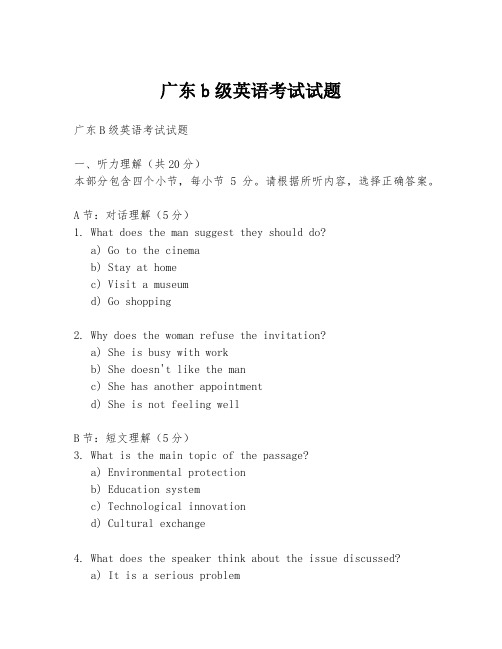
广东b级英语考试试题广东B级英语考试试题一、听力理解(共20分)本部分包含四个小节,每小节5分。
请根据所听内容,选择正确答案。
A节:对话理解(5分)1. What does the man suggest they should do?a) Go to the cinemab) Stay at homec) Visit a museumd) Go shopping2. Why does the woman refuse the invitation?a) She is busy with workb) She doesn't like the manc) She has another appointmentd) She is not feeling wellB节:短文理解(5分)3. What is the main topic of the passage?a) Environmental protectionb) Education systemc) Technological innovationd) Cultural exchange4. What does the speaker think about the issue discussed?a) It is a serious problemb) It is a minor concernc) It is a temporary issued) It is a positive developmentC节:信息匹配(5分)5. Which number corresponds to the man who is a doctor?a) 1b) 2c) 3d) 46. What is the woman's occupation?a) Teacherb) Nursec) Lawyerd) EngineerD节:填空题(5分)7. The library opens at _______ in the morning.8. The last bus leaves at _______ in the evening.9. The museum is located _______ from the city center.10. The concert starts at _______ and ends at _______.二、阅读理解(共30分)本部分包含三篇文章,每篇文章后面有五个问题。
2021年广东高考英语听说考试TestB试题及答案
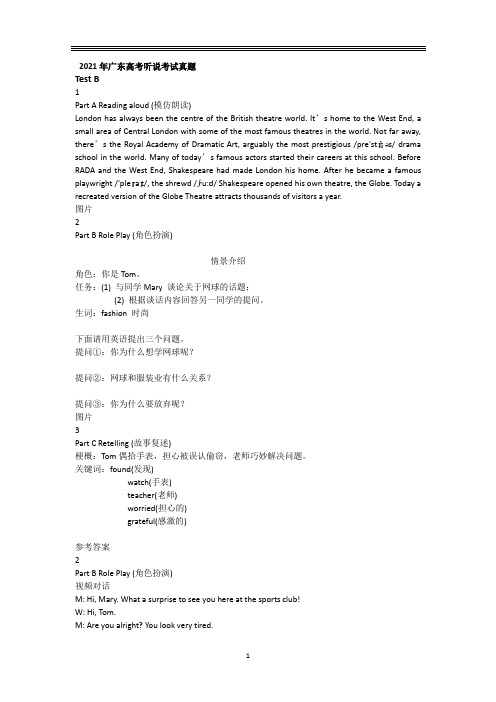
2021年广东高考听说考试真题Test B1Part A Reading aloud (模仿朗读)London has always been the centre of the British theatre world. It’s home to the West End, a small area of Central London with some of the most famous theatres in the world. Not far away, there’s the Royal Academy of Dramatic Art, arguably the most prestigious /pre'stɪʤəs/ drama school in the world. Many of today’s famous actors started their careers at this school. Before RADA and the West End, Shakespeare had made London his home. After he became a famous playwright /'pleɪraɪt/, the shrewd /ʃru:d/ Shakespeare opened his own theatre, the Globe. Today a recreated version of the Globe Theatre attracts thousands of visitors a year.图片2Part B Role Play (角色扮演)情景介绍角色:你是Tom。
任务:(1) 与同学Mary 谈论关于网球的话题;(2) 根据谈话内容回答另一同学的提问。
生词:fashion 时尚下面请用英语提出三个问题。
提问①:你为什么想学网球呢?提问②:网球和服装业有什么关系?提问③:你为什么要放弃呢?图片3Part C Retelling (故事复述)梗概:Tom偶拾手表,担心被误认偷窃,老师巧妙解决问题。
广东省高考英语听说考试真题B答案
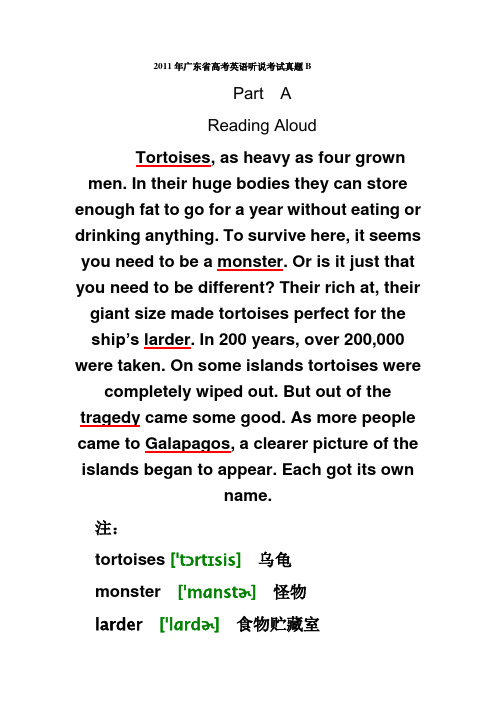
2011年广东省高考英语听说考试真题BPart AReading AloudTortoises, as heavy as four grown men. In their huge bodies they can store enough fat to go for a year without eating or drinking anything. To survive here, it seems you need to be a monster. Or is it just that you need to be different? Their rich at, their giant size made tortoises perfect for the ship’s larder. In 200 years, over 200,000 were taken. On some islands tortoises were completely wiped out. But out of the tragedy came some good. As more people came to Galapagos, a clearer picture of the islands began to appear. Each got its ownname.注:tortoises [ˈtɔrtɪsis]乌龟monster [ˈmɑnstɚ]怪物larder [ˈlɑrdɚ]食物贮藏室tragedy [ˈtrædʒɪdi] 杯具(悲剧)(那个地方名我不会,sorry…)Part BRole Play情景介绍任务:(1)采访Dr Brown 有关外语学习的问题。
(2)根据谈话内容回答问题。
视频文本内容:W: Dr. Brown, welcome to today’s program.M: Thank you. It’s a pleasure being here.W: We know that you are a language specialist, and you just published a book on how to learn a foreign language. And it’s selling well, so tell us the title of your book?M: It’s called “Learning a language over Exand Tost” (音)W: That sounds very interesting, tell us what you discuss in your book.M: It is very important to set up a regular program like planning a few minutes every morning around the breakfast time.W: But I have been learning Spanish for four years, and I haven’t become a good speaker ofit.M: We can’t become fluent speakers in the matter of a few minute hearing that. We should follow a regular course of study.三问:1. 你能再多说点吗?Q:Could you please speak a little more?A;My basic suggestion is to learn a foreign language by talking small steps. Some people think they can learn a foreign language in thirty days, and they become very discouraged when they can’t. Learning 5 words a day and learning to use them actively is far better thanLearning 30 and forgetting them the next day. But people many have different learning styles.2. 你说的学习风格是什么意思?Q:What do you mean by “learningstyles?”A:I mean different ways of learning. Some prefer to see models of the patterns they are expected to learn; others see the hearing instructions over reading them. All preferences are determined by factors so just character, culture and past experiences.3. 你是如何学习外语的?Q:How did you learn a foreign language?A:I learned while doing things. Moving around as well as trying to learn helps me. I often recite aloud the words when I cook potatoes and onions for breakfast in the morning.五答:1. Q:What is Dr. Brown’ s book about?A:It’s about how to learn a foreign language.2.Q:How long has the woman been learningSpanish?A:4 years.3.Q:What is Dr. Brown’s basic suggestionon learning a foreign language?A:To learn a foreign language by takingsmall steps.4.Q:What factors determine one’s learningstyles?A:Factors like character, culture andpast experiences.5. Q: What does Dr. Brown often do when he prepares his breakfast?A:He often recites aloud the words.Part C梗概:Tom 下班后被锁楼里,办公室电话不通,最后设法找到门卫出去了。
- 1、下载文档前请自行甄别文档内容的完整性,平台不提供额外的编辑、内容补充、找答案等附加服务。
- 2、"仅部分预览"的文档,不可在线预览部分如存在完整性等问题,可反馈申请退款(可完整预览的文档不适用该条件!)。
- 3、如文档侵犯您的权益,请联系客服反馈,我们会尽快为您处理(人工客服工作时间:9:00-18:30)。
教学点: 年级: 班级: 姓名: 学号:密封线内请不要答题广东外语外贸大学成人高等教育英语(本科)2014学年第一学期《听力口语》试题(B 卷)年级:2013级 考试形式:闭卷 考试时间:90分钟……………………………………………………………………………………………………一、单项选择题(本大题共10小题,每小题3分共30分)Directions: You’re going to hear ten short statements. It will be read twice.Listen carefully and choose the answer which is closest in meaning to the statement you hear.a. John came at 8:45.b. John came at 8:50.c. John came at 7:45.d. John came at 9:20.2. a. Ninety people came. b. Thirty people came. c. Sixty people came. d. Twenty people came.3. a. We ’ll go to the party if we finish on time. b. We ’ll go to the party after class. c. We went to the party after the exam. d. We ’re going to have a party after the exam.4. a. Please take your hand off the box. b. Please give me your hand. c. Would you help me to carry the box? d. Give me the box, will you.5. a. Breakfast was ready before we left. b. We left without having breakfast. c. Before breakfast we were ready to leave. d. We left to get breakfast.6. a. I don ’t mind turning down the radio. b. Please turn down the radio.c. Do you mind if I turn down the radio?d. Please don’t turn down the radio. 7. a. I went to the wrong class. b. I missed the class. c. I came to class on time. d. I was late for class. 8. a. After it snowed, Jim washed his car.b. Jim was unable to wash his car because it was snowing.c. It began to snow right after Jim washed his car.d. Jim had to wash his car in the snow. 9. a. How was the potluck supper?b. We had a potluck supper together.c. I ’ d like you to come for our potluck supper.d. What will you bring for the potluck supper. 10. a. Bob saw Mary in the building.b. Bob saw Mary outside the building.c. Mary saw Bob when she left the building.d. Mary saw Bob when he was leaving the building.二、 (本大题共 10 小题,每小题2 分,共20 分)Directions: You ’re going to hear ten short conversations between two speakers. At the end of each conversation, a question will be asked about what was said.1、 a. Remind Cathy about the time of the next meeting.b. Remind Cathy not to be late for every meeting.c. Tell Cathy about the agenda of the next meeting.d. Tell Cathy about a ring. 2. a. She will turn off her recorder.b. She is not responsible for the noise.c. She will do something about the noise.d. She wants the man to use earphones. 3. a. Jane is not so forgetful.b. Jane used to have a good memory.c. Jane shouldn’t be so nervous.d. Jane should not try to memorize the whole script. 4. a. She doesn’t have time to go outside. b. She’ll consider the man’s advice. c. She knows how to relieve her stress.d. She will feel more stressful if she gets behind in her lessons. 5. a. The man shouldn’t buy so many discs. b. The man should stop buying discs. c. The man shouldn’t worry too much.d. The man should go shopping less. 6. a. Both speakers were bored with the movie.教学点: 年级: 班级: 姓名: 学号:密封线内请不要答题b. The woman didn’t like the movie but the man did.c. The man didn’t like the movie but the woman d id.d. The man didn’t think he would like the movie at first but later did. 7. a. Practice their speeches. b. Have a big celebration.c. Prepare their arguments for possible topics.d. Take a good rest. 8. a. Brave. b. Healthy c. Helpful. d. Strong.9. a. He is an irresponsible father.b. He is careless.c. He is very busy with work.d. He is indifferent to his family.10. a. She knows something about her own real condition.b. She knows nothing about her own real condition.c. She doesn’t know anything about Mary’s real condition.d. She doesn’t want to know about Mary’s real condition .三、(本大题共 10 小题,每小题 2 分,共20 分)Directions: You ’ll hear a passage. It will be read three times. Listen carefully and supply the missing word.Some people have good memories, and can easily learn quite long poems by heart. There are other people who can only remember things which have been repeated to them many times.The famous English writer, Charles Dickens said that he could walk down any long street in London and then tell you the name of every shop he had passed.A good (1) is a great help in learning a _(2)_. Everyone learns his or her own language by remembering what he or she hears in (3)_ days, and children who live _(4)_ with their parents seem to learn two languages easily at the same time. But it is not so (5)_ to learn a _(6)_language in school, because the pupils have _(7) chance to hear and _(8)_ the language out of class. What ’s (9)_, they are busy with other (10)_. 四、(本大题共 30 小题,每小题 1 分,共30 分)Passage A : Let’s Go to the Movie1. Directions: Listen to the dialogue and choose the best answer to complete each of the following statements.2. The woman wants to go to the movies because ______________________.a. she is tired of staying at home all dayb. there is a good film in the neighborhood theaterc. she enjoys going to the moviesd. she is tired of watching TV2) The woman says, ‘I ’ d rather not spend a lot of money.’ This sentence implies that _____________.a. she prefers to spend money on something elseb. tickets in downtown theaters are very expensivec. people cannot help buying things if they go downtownd. it would take a long drive to get there3) The woman says she doesn ’t want to see the movie Gone with the Wind because ____________.a. the movie theater is too far awayb. the film is too oldc. she doesn ’t want to see it a second timed. it ’s a popular film so the tickets would be quite expensive.4) Finally the couple decide to ___________.a. go and see a horror filmb. stay home and watch TVc. go to a movie in the neighborhoodd. go downtown next Friday5) You may infer from the dialogue that ____________.a. people are tired of watching TV nowadaysb. baseball games attract more people than films doc. there aren’t any films worth seeing in local theatersd. the woman is rather hard to please3. Directions: Listen to the dialogue again and write ‘T ’(True) or ‘F ’ (False) for each statement you hear.4. The couple live down town. ( )1) The woman doesn ’t want to see Gone with the Wind at the Grand Theater. ( ) 2) The man suggested some movie theaters but the woman accepted none of them. ( )3) Both the man and woman like baseball. ( )4) The conversation took place on a Friday evening. ( )Passage B: Women in Business1. Directions: Listen to the passage and choose the best answer to each question you hear. 1) What do you know about French businesswomen? a. They enjoy equal pay for equal work.b. Most of them can be promoted to the highest rank if they choose.c. They seem to receive better treatment (对待) than women in most other countries.d. They are not clothes conscious.2) What does the speaker intend to say through the passage about French businesswomen?a. They are fortunate and admirable.b. They are proud and self-centered.c. They are beautiful and elegant (优雅的).d. They are capable and generous.教学点: 年级: 班级: 姓名: 学号:密封线内请不要答题3) What is implied in the passage about French businesswomen? a. They are hard to please (取悦)b. They are unlikely to stay on their jobs when they get married.c. They are as capable and aggressive (干劲很大的; 积极进取的)as the Frenchbusinessmen..d. They are too feminine (柔弱的).2. Directions: Listen to the passage again and complete the following statements with the information you get from the tape.Frenchwomen see no (1)n______ to abandon femininity and elegance in the business (2) w_______. They prefer (3)s______ colors, (4)s ______ clothes, (5)s_______ scarves, manicured (修饰过的) (6)n________, light (7)m_______, and simple but elegant jewelry.Passage C: Do You Like Sports?1. Directions: Listen to the passage carefully and choose the best answer to each question you hear.1) What is the probable relationship between the man and the woman? a. Two sports fans. b. Two acquaintances.c. Customer and shop-assistant.d. Foreign tourist and his guide.2) What did the man seem to like to do? a. To play all sports.b. To watch games and shows of all kinds.c. To play and talk about sports with friends.d. To talk about sports and watch sports games on TV.3) What did the man mean by saying, ‘I never miss Wimbledon ’? a. He went to Wimbledon every year.b. He went to Wimbledon every year to watch the international tennis games there.c. He always watched tennis games held in Wimbledon.d. He had never played tennis in Wimbledon. 4) Why did the man come to the woman?a. He came to talk to her about his favorite sports.b. He came to invite her to join him in some sports.c. He came to ask her to play tennis with him.d. He came to buy something.5) What can you infer from the dialogue?a. The man was really a very good sportsman.b. The man didn ’t seem to be an active sportsman.c. The woman didn ’t like sports.d. The man was only interested in watching TV.2. Directions: Listen to the passage again and complete the following statements with the information you get from the tape.The man asks the woman if she has read about the World ____ in today ’s____.a) The man said that ____ was a wonderful game.b) The woman says that she is not a good____, but she goes____ sometimes.Section BA B1. comedy a. having the force of law2. accomplish b. change completely in form, appearance or nature3. embarrassed c. prices increase and money becomes less valuable4. generate d. cause oneself to enter deeply into an activity5. Perseverance e. make … different in form, quality, etc6. transform f. a funny play in which the story and characters are amusingand which ends happily7. diversify g. finish successfully8. valid h. continuing steadily and with determination in spite ofdifficulties9. inflation i. ashamed, nervous, or uncomfortable in a social situation 10. immerse j. cause to exist or occur。
